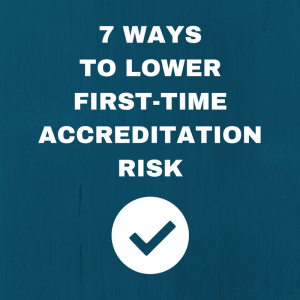| Accreditation can be daunting for both new and existing organizations. With a 100% accreditation success rate, BHM is an expert in the accreditation field. Click here to learn about how BHM can help you with accreditation. |
An organization’s accreditation status is an external seal of approval proving its commitment to quality and continuous improvement. In the healthcare industry, accreditation has become one of the biggest markers of success that patients and payers look for in an organization. Although mostly voluntary, accreditation is becoming the best way for healthcare organizations to improve efficiency and gain a competitive advantage. No matter what type of accreditation you are pursing the core elements remain the same. You have to meet specific standards; have documented processes which satisfy accreditation requirements; and have appropriate documentation in place.
The multifaceted world of accreditation can be daunting, from choosing the right accreditation body to getting correct documentation in place to ensure accreditation success. Here are 7 tips to keep you on track and lower first time accreditation risk.
- Know Where You Stand
Before beginning the accreditation process, conduct an organizational analysis to understand where your organization stands and how prepared you are for accreditation. If you do not set aside the amount of time and personnel needed for a thorough analysis, reach out to a group with the expertise for completing this cornerstone report.
- Know the Risks
The key risks for first time accreditation vary by organization. Understanding what type of risks you could face will be key to staying on top of any hiccups or delays in the accreditation process.
- The Accreditation Budget
Do you have a budget set aside for accreditation? A budget not only for the accreditation itself but for staff training and labor costs will need to allocated. If you don’t have an accreditation budget, such as setting aside the needed personnel and time, failing to budget accordingly puts the accreditation process at risk for failure or an additional, costly rework of the application.
- Stay Organized
Get organized and stay that way. The organization of your data and records is vital for internal success, and is beneficial for the auditor. Conducting a policy review and an internal audit prepares you for the accreditation process. Stress the importance of streamlining all processes and procedures to your staff.
- Embrace Accreditation Organization-Wide
Organizations must learn to weave the accreditation process into organizational culture. When organization train staff across all levels to embrace the accreditation process and the required activities as quality and organizationally required activities, the processes and protocols become woven into the natural operations of the organization.
- Have the Right Leadership
Organizations who are most successful at obtaining accreditation have strong cross functional teams working on accreditation. They have provided appropriate authority for their Quality Department which is supported by leadership to facilitate collaboration throughout.
- Choose the Right Accreditation Partner
Organizations working towards their first accreditation benefit working with experienced accreditation consultants. Experience efficiently guides you through the process, often returning the financial investment back through the staff time saved.
Here are a few key questions for your potential partner:
- Is this organization accredited? Groups earning their own accreditations understand the importance and nuances of helping others earn accreditations.
- Do you they have a proven track?
- Are they timely?
- How much experience does the consultant team have with your specific accreditation?
The key to achieving extraordinary success through accreditation is rooted your organization’s ability to proactively plan, allocate resources, identify risks, and recognize key milestones. If this accreditation preparation is daunting to you, bring in accreditation experts to help organize all the facets of the accreditation process and avoid accreditation risk.




